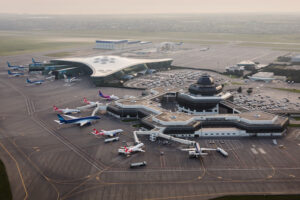
Normally I just make an association with the number of the blog with the title, and let the reader deduce the association. But I have had to alter the title of this blog from Tonga to Timor Leste with the fall of Liechtenstein, to accommodate the number 197. Why? Because in the latest FIFA rankings issued on 22 December, Liechtenstein have fallen two places in the rankings, where San Marino rounds out the 211 ranked nations. As a result, Tonga and Timor Leste have moved up one place each in the rankings.
Following the recent World Cup, Australia and Morocco have made the greatest advances up the ranks, each rising 11 places. Morocco is now at 11 and Australia 27. Canada and Qatar fell the furthest, each cascading down 12 places to 53rd and 62nd respectively. Wales slumped to 28th, registering a fall of nine spots. Denmark has fallen eight spots to 18th position and Serbia is down eight spots to 29th.
Brazil still heads the rankings with Argentina second and France third, with Belgium plummeting to fourth.
Ceduna 2002
 We met a few people once in Ceduna like Jay Pasachoff whose death, at 79 years of age on November 20th, was reported in an obituary in a recent Economist (December 10-16th). In Ceduna there was a total eclipse of the sun in 2002, and the Allens and the Best-Sargeants decided to venture across to view it. Like much of which we did together, it was a spur of the moment decision. When we had done the same for the Sydney Olympics, we bought the original package, which included tickets for the Opening Ceremony. That spur of the moment decision was timely; the proposed trip to Ceduna was not.
We met a few people once in Ceduna like Jay Pasachoff whose death, at 79 years of age on November 20th, was reported in an obituary in a recent Economist (December 10-16th). In Ceduna there was a total eclipse of the sun in 2002, and the Allens and the Best-Sargeants decided to venture across to view it. Like much of which we did together, it was a spur of the moment decision. When we had done the same for the Sydney Olympics, we bought the original package, which included tickets for the Opening Ceremony. That spur of the moment decision was timely; the proposed trip to Ceduna was not.
The immediate problem of getting to Ceduna was solved by our flying to Adelaide and getting a lift with the Allens who drove over from Melbourne and picked us up at the airport. There were 780 kilometres still to drive. We senza Allens had previously been to Ceduna on a memorable occasion when my wife injured herself on the way to the airport and by the time she had arrived to meet me in Adelaide (I had been in Whyalla) she was unable to walk, but that can wait for another blog .
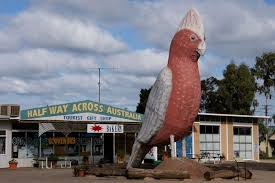 However, on this occasion we went the inland route through both the townships of Wudinna (where there is a mini-Uluru, Mount Wudinna) and Kimba (where the Big Galah glowers down upon the traveller). The second problem which had faced us was there was no accommodation in either Ceduna or Streaky Bay. We should have anticipated that, given that Ceduna itself is isolated except for the Aboriginal communities in the West and Streaky Bay in the East. Any other accommodation was over 100 kilometres away and only in a caravan park. Fortunately, I knew some of the Prideaux family and I contacted one of the elders whom I prefer not to name for cultural reasons, and she said they had an empty Aboriginal owned house in Ceduna. Yes, she said we could have it for the week. Given how difficult accommodation was, it was a Godsend to be able to rent such a three bed-roomed house in the centre of town.
However, on this occasion we went the inland route through both the townships of Wudinna (where there is a mini-Uluru, Mount Wudinna) and Kimba (where the Big Galah glowers down upon the traveller). The second problem which had faced us was there was no accommodation in either Ceduna or Streaky Bay. We should have anticipated that, given that Ceduna itself is isolated except for the Aboriginal communities in the West and Streaky Bay in the East. Any other accommodation was over 100 kilometres away and only in a caravan park. Fortunately, I knew some of the Prideaux family and I contacted one of the elders whom I prefer not to name for cultural reasons, and she said they had an empty Aboriginal owned house in Ceduna. Yes, she said we could have it for the week. Given how difficult accommodation was, it was a Godsend to be able to rent such a three bed-roomed house in the centre of town.
As a side comment, if one wants to get the freshest King George whiting, Ceduna certainly was the place, when we were there.
Like many small, isolated settlements, Ceduna has its own distinctive culture. One often finds Pitjantjatjara people in Ceduna. They roam around the Great Victoria Desert, which lies between Ceduna and their settlements in the far North of South Australia, in settlements such as Ernabella and Fregon. Aboriginal people can be reticent, but ask them what mob they are from and they‘ll open up.
The eclipse had lured a number of them across the desert; their traditions had bequeathed the landmarks so they can go safely from one place to another, where we white fellas would only see stone and sand and spinifex. Research studies have revealed that “Pitjantjatjara communities would project sacred stones at the eclipsing Sun whilst chanting a particular song—always with success. The act of casting magical stones at the Sun strengthened the medicine man’s status in the community since he was always successful in bringing the Sun back from the darkness, averting the evil and saving the people.”
The Aboriginal medicine men were often very shrewd, and before modern science knew that this was a natural phenomenon upon which to base their illusionary magical powers. It is amazing what was once seen as a mystical expression of a higher power, whatever called, can now be as precisely calculated as what will happen tomorrow to us cannot. This particular eclipse was thus slated for 4th December 2002, and expected to start between 6.38 pm and 6.45 pm on that day. The total eclipse would last for 32 seconds, the longest time in any of the places across Australia. We duly went down to the beach, the clouds cleared, donned our eclipse glasses and settled down to watch the spectacle. I had been in Melbourne on October 23, 1976 when the city was plunged into that eerie light of the solar eclipse, but since I was in a built up area without any protection for my eyes I did not see the eclipse directly.
At Ceduna, it was different. Once the eclipse came, it was as in all the textbook descriptions but being there experiencing the passage, the penumbra, the diamond effect of the sun reappearing, it was all so worthwhile. Thirty-two seconds of a light which is described as “eerie” is that of a special dimness, so hard to define if you have never experienced it. If there had not been some whooping, it would have been silent – a silence most fauna respect. Then the eclipse was over, the sun emerged. We did not get up and immediately fold our deck chairs. We just kept looking out to sea.
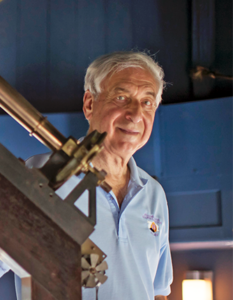 Jack Pascachoff was, for 50 years until his death, the Professor of Astronomy at Williams College Massachusetts and director of its Hopkins Observatory. To him “the perfect alignment, in solemn darkness, of the celestial bodies that mean most to us” gave a primal thrill that was indescribable. As a self-styled “umbraphile”, a shadow-lover, his greatest joy was to stand in that brief darkness cast by the shadow of the Moon”. His College is ranked as top in national liberal arts across the USA, and is located in Williamstown, Massachusetts, in the Berkshires and is one of the oldest colleges in the country. The school was originally a men’s college; women were first admitted in 1971 – almost all students are resident.
Jack Pascachoff was, for 50 years until his death, the Professor of Astronomy at Williams College Massachusetts and director of its Hopkins Observatory. To him “the perfect alignment, in solemn darkness, of the celestial bodies that mean most to us” gave a primal thrill that was indescribable. As a self-styled “umbraphile”, a shadow-lover, his greatest joy was to stand in that brief darkness cast by the shadow of the Moon”. His College is ranked as top in national liberal arts across the USA, and is located in Williamstown, Massachusetts, in the Berkshires and is one of the oldest colleges in the country. The school was originally a men’s college; women were first admitted in 1971 – almost all students are resident.
Pascachoff had observed 75 eclipses, and we met some of these eclipse devotees in Ceduna – but do not remember Pascachoff among the crowd. These people travelled from one eclipse site to the next, which at that time was Chile, I heard one of them say. Well, as I say, some people collect teddy bears, and others obsessively try and visit every State in the USA.
In reading the obituary, I loved the anecdote of an eclipse in Manitoba, when he was shocked by the drivers who just turned on their headlights and kept moving. As one would say, takes all types…
He enthused his students and “an even better eclipse was forecast for 2024, with totality from Mexico to the Canadian Maritimes. He wanted everyone to observe it. As for him, he was already plotting hotel reservations in Sinaloa, the place with the best view.” Maybe now his view will be unique.
De-Hoarding
I am in “the throwing out” phase of my life. While not pathological, I tend to keep correspondence I should have turfed out years ago. But there is a certain nostalgia for my several careers. For instance, I moved out of clinical and laboratory research at the end of 1971. Some of my co-authors went back to the own countries. I had corresponded with them while we finished collaborative work, and then I moved on. I kept the reprints, and I wondered what had become of them in the intervening years. I found out one was deregistered over 20 years ago for falsifying consent forms for his clinical research; and the other has been showered with honours as an eminent professor clinician. Their notoriety is recorded on Google, and for better or for worse these two research chums had not just faded away without leaving any trail.
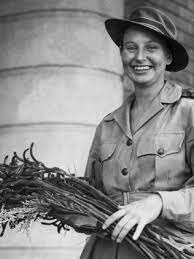
The problem when you throw out correspondence, I am walking with ghosts. Not all the old correspondence went into the wastepaper basket. For instance, there are some very friendly correspondence. In 1988, I wrote a book for the Bicentenary entitled “Portraits in Australian Health”, one of whom came from interviewing Vivian Statham who, as Vivian Bullwinkel, survived the Bangka Island massacre where all her fellow nurses were gunned down by the Japanese in 1942, and she survived wounded but able to nurse herself back to a state where she was able to spend the rest of the war as a prisoner of war tending to other POWs.
Initially she had declined to be interviewed, but relented. Even in her interview, at least at the start, her husband was present and she was a little wary throughout, but after I sent her a copy of the book I was very pleasantly surprised by her letter in reply in which she thanked me and praised the content and the style. Such letters are what encourages one to live another day
Given that life is a cascade interrupted by changes of direction, I have met a great many people, and so many have contributed to my tiers of paper. One can kid oneself that they are archives; really it is underlying vanity that some person will want to write one’s biography in the future – as if one’s life provides a unique insight worthy of such.
With the help of three of my grandchildren, we emptied out two large storerooms, and then this evacuation ground to a halt. Obviously word of the experience had gone down the line and emptying dusty storerooms was not for them, even if it was their grandfather’s so-called heritage. At one stage, no 2-grandchild asked point-blank why I was keeping all this stuff. The problem is that there are regulations which insist on records being kept for a varying number of years, and when you are working, it is easier to store more than less. But for a perspicacious teenager, that was a lame excuse.
I wish I had written a diary from whenever. The blog is a useful piece of technology which pen and paper, and scrawled notes, and annotated files could never be. However, I had the foresight to at least have a set of “Personal” files, but even that has been in a chaotic state because filing is always a problem when you live an itinerant life. I hope to have sufficient time at least to catalogue the stuff which provides a useful legacy. Nevertheless, as I say a diary would have helped, although imagine 60 years of compulsively written diary. Would have spent less time in the non-members bar. Maybe.
The Essential Breakfast
If there were no other meal in the day, I would always choose breakfast.
I was musing about this because in the morning when all the various rituals I have to follow – the ablutions, the tablets, the skin medications, the compression stockings – have finished, then breakfast comes along. It is a time of enjoyment as my wife is a very good provider. While she has a routine with variety of either mushrooms on toast, or bacon sandwich, or muesli, or boiled eggs, or scrambled eggs, or avocado and tomato on toast, or omelette. Welsh rarebit is reserved for St David’s Day.
My favourite is the poached eggs that she conjures. Long ago these eggs were cooked in those soulless metal poachers, which produced those semi-lunar firm, maybe eminently edible – but essentially breakfast via the tradesmen’s entrance.
 My wife’s poached eggs are sublime. In Italian, poached eggs are called uova camicia, literally eggs in a shirt. The shirt analogy gives an impression of a free-flowing white tail floating in the hot spring water. These are not the poached eggs, neat compact white nuggets, uova in canovaccio , highly professional but in the end lacking the abandon of my wife’s expertise.
My wife’s poached eggs are sublime. In Italian, poached eggs are called uova camicia, literally eggs in a shirt. The shirt analogy gives an impression of a free-flowing white tail floating in the hot spring water. These are not the poached eggs, neat compact white nuggets, uova in canovaccio , highly professional but in the end lacking the abandon of my wife’s expertise.
So much enthusiasm for an ordinary chook’s egg – not from the araucaria with their blue eggs; or duck eggs with their rich yellow yolks or speckled quail eggs.
She also makes a mean uova strapazzate – such a demonstrative word for scrambled eggs. The Italians say it so well.
But back to the start. My original introduction to breakfast as a child emerging from infancy was porridge. One of my earliest memories was the sight of porridge bubbling away on the wood-fired stove of my aunt who had married into a Scottish clan. I always remember her gentle boiling of the oats, which she stirred in milk and water, clockwise. Counter-clockwise was considered unlucky. I was always intrigued when my aunt added salt to the porridge and yet before we ate it, we smothered it with brown sugar. I learnt that for hot liquid you ate from the edge where it was cooler. I remember there was always a sprinkle of wheat-harts on the top, to keep us all regular, the meaning of which I did not understand at the time.
Years later, I learnt that porridge was stirred with a spurtle, a round rod with a smooth surface which prevents the oats from adhering as one stirs and thus preventing the porridge from clumping together. These spurtles were turned from Huon pine and form an unusual present for my Scottish friends – cheaper than whisky. Today, I rarely have porridge; and except for Weet-bix we never ate the products which the Seventh Day Adventists through John Kellogg and his disciple Edward Halsey had foisted onto the Australian breakfast menu. On my mother’s rather lengthy list of proscribed people were Adventists. There was one cereal exception and that was rice bubbles with their characteristic “snap, crackle, pop”, which I, the kid, insisted on pouring the milk over to elicit the sound. The actual consumption was very much a secondary phenomenon.
I always want tea in the morning and, as varieties of tea multiplied, I have settled on Earl Grey tea as the preferred one. A minor point was that my mother insisted on never having Bushell’s tea in the house; never knew why. At the same time during the War, coffee was very difficult to obtain, and chicory was the substitute. I remember Turban essence!
Countries where tea does not form part of the normal breakfast, I suppose I tolerate, except when the tea is made with the water not boiling. After my mother died, my father had Mrs Ruff come in and cook our breakfast which was invariably fried eggs and bacon every weekday morning. As you would imagine, this is not now my favourite breakfast even when it is offered “sunnyside up.”
I suppose university, when I barely woke up before lectures, was a time I ate very little breakfast and where instant coffee was de rigeur. It was a time when I first became acquainted with Italian style coffee – the cappuccino and the long black. Breakfast was always rushed, a piece of fruit, a piece of toast. and not enjoyable, unless the marmalade was special. Otherwise, Vegemite abounded; or in my early years it was Marmite.
And of course there was one fad, which became a stable on the breakfast table, and which mostly I avoided especially when I was dieting – and that was orange juice. “OJ” is calorie packed and moreover I sympathise with the American writer who commented: “Scientists still don’t know exactly why orange juice and toothpaste combine to create a taste somewhere between sauerkraut and battery acid, but the suspicion is it has something to do with sodium lauryl sulphate, the primary ingredient in toothpaste’s cleansing agents.”
Then for ten years in later life I used to live for part of the week in a motel in the Victorian town of Cobram where I was working. My breakfast invariably was a plate of sausages, and these sausages were the best breakfast sausages I had ever tasted. For the first time in years I had time to read the paper and have a meal I really enjoyed, day after day.
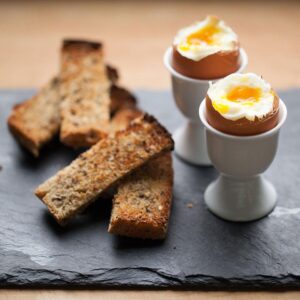 There have been memorable breakfasts. One was in a hotel on the island of Guernsey, where the boiled eggs were just “runny” right in which to dip “the soldier toast”. The other was at the Randolph Hotel looking out on the Oxford streetscape and tucking into a plate of kippers. Then I have also written a poem about the time we had breakfast on the Moonie River among the coolabah trees, which is soon to be published. The Moonie flows by the settlement of Flinton, where we were staying at the time, in Southern Queensland near the NSW border, before emptying into the Barwon River near St George.
There have been memorable breakfasts. One was in a hotel on the island of Guernsey, where the boiled eggs were just “runny” right in which to dip “the soldier toast”. The other was at the Randolph Hotel looking out on the Oxford streetscape and tucking into a plate of kippers. Then I have also written a poem about the time we had breakfast on the Moonie River among the coolabah trees, which is soon to be published. The Moonie flows by the settlement of Flinton, where we were staying at the time, in Southern Queensland near the NSW border, before emptying into the Barwon River near St George.
Nevertheless, overriding every breakfast is the perfect cup of tea. I unfortunately have the propensity of not drinking mine until it has passed its prime. There is a point when tea is sublime, but you have to know the point when you have drunk of it.
One way of Putting It
Thus it is with a feeling of guarded optimism that we, as a nation, reach the end of this disturbing year and, thankfully, enter the holiday season. The festivities are somewhat subdued this year, as inflation forces consumers to cut back; according to the US Commerce Department’s Bureau of Conifer Statistics, the Median Household Christmas Tree Height (MHCTH), which last year was “LeBron James,” currently stands at “Danny DeVito.” – Boston Globe.
Mouse Whisper
With acknowledgement to Mr A.B. Paterson:
CHRISTMAS AMONG THE AZERI
(or if we had no Joyce in the matter?)
On the outer Baku where the churches are few,
And men of religion ride donkey,
On a tarmac never cross’d ‘cept by folk that are lost,
One Alan Joe Joyce has a shonky.
For our pocket Ulysses the last verse goes something like this…
And Joey Joyce has been made an AC
And the one thing he hates more than sin is
To be asked by the folk who think him a flea,
When oh, when will he bloody well finis’
A Courageous New Year to you All from Me and The Mouse
